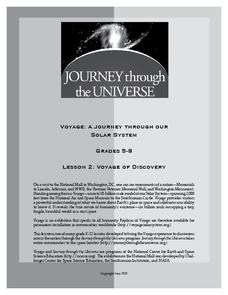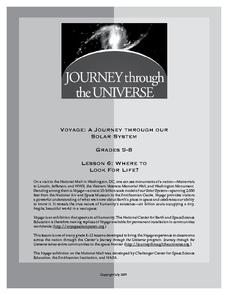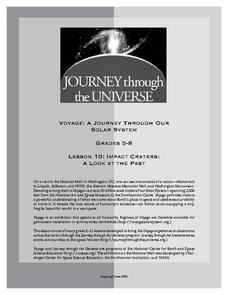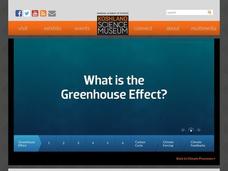Curated OER
4.2: Exploring Rocks
Young scholars collect and look at rocks and write down information about them in science notebooks. They make comparisons and sort the rocks according to their properties, and then discuss their findings with their classmates and put...
Curated OER
Women in Science
Students study the roles that women have played in science throughout history. They work in small groups while visiting the Smithsonian National Museum of American History.
Curated OER
The Brooklyn Museum of Art Newspaper
Students create newspapers. In this technology skills lesson, students create a newspaper layout using a word processor program. The newspaper features stories regarding the Brooklyn Museum of Art.
Curated OER
"The Science Times"
Students create their own newspaper after gathering information at the Museum of Natural History's Hall of Biodiversity.
Curated OER
A Bug's Life
In this biology activity, students create a presentation for a museum about the children they encounter during their journey as an insect. They identify the types of food the insect eats and its habitat. Students also describe their...
Curated OER
Skulls Tell It All
Skulls tell it all, and with this lesson plan, you will tell it all to your class! Youngsters view animal skulls, analyzing the shape of teeth and the placement of the eye sockets. They associate these adaptations with the types of food...
Curated OER
Reptiles and Amphibians
Introduce your class to various reptiles and amphibians. They will meet and identify a representative from each of the four major reptile families, then learn about and discuss reptile characteristics. Next, they will identify and...
American Museum of Natural History
Field Trip Mars
Fly around the Martian surface. Pupils view a presentation on the planet Mars featuring a flyover that shows different views of the surface where rovers have landed and explored on different missions. As individuals watch the images, the...
Curated OER
Classifying Plants and Insects
Art and science come together in a lesson based on Flower Still Life by Ambrosius Bosschaert the Elder. Learners classify plants and insects in the painting by color, leaf shape, size, reproduction, and season of bloom.
Curated OER
The Museum under the Magnifying Glass
Students research different aspects of a museum through its website. They distinguish responsibilities performed by the people who work in museums and read about collection procedures.
Baylor College
Heart Rate and Exercise
What is the relationship among the heart, circulation, and exercise? Your class members will explore first-hand how different physical exercises affect an individual's heart rate. They will begin by learning how to measure their own...
Baylor College
Activity and Exercise
Leave it to the classic jump rope to get your class excited about physical activity! Your class will begin by discussing the benefits of jumping rope as a form of exercise and learning a few different types of jumps. Then in groups of...
Journey Through the Universe
Is There Anyone Out There?
What is an alien's favorite game? All-star baseball! Scholars start defining living and non-living. Then, they conduct experiments to research if life exists, keeping in mind that life could be in many forms, not just human.
Journey Through the Universe
Voyage of Discovery
Did you know that Pluto is smaller than the United States of America? It is difficult to conceptualize the size of planets and the distance between them, and the lesson addresses those exact issues. After a discussion, pupils create...
Journey Through the Universe
Where to Look For Life?
Every year we discover new planets including more than 1,000 in 2016 alone. Will we ever find life on another planet? The lesson includes two activities to help scholars understand this concept. First, they analyze the temperature range...
Journey Through the Universe
Impact Craters: A Look at the Past
The Galle crater on Mars is also known as the Happy Face crater because of its appearance. First, scholars use pebbles and flour to simulate craters and study their properties. They then apply this knowledge to help decipher the history...
Journey Through the Universe
The Voyage Scale Model Solar System
Young scientists learn how to select a scale factor for a large scale model. Then they figure the scale for each of the planets and the distance between them. Finally, they construct a giant scale model of the solar system and answer...
Curated OER
Museums in the Classroom Pumpkin Project
Students identify the 5 stages in the life cycle of a pumpkin. They create a model showing the correct order of pumpkin life stages. They explain a pumpkin's life cycle to a partner, using their model.
Curated OER
Space Science: Journey Through the Solar System
Students explore the Solar System and examine the characteristics of al the planets. Through research and discussion, they create catalogs of the Solar System's components. Next, students use their findings to create Powerpoint...
Curated OER
Looking at French Decorative Arts: The Science of Good Design
Young scholars examine the style of an 18th-century compound microscope and its case. In this scientific design lesson plan, students look at Jacques Caffieri's, "Compound Microscope and Case" before comparing the design to a modern...
Curated OER
Roadkill Museum
Students use roadside kill to use taxidermy skills, become comfortable working with animals and dissecting.
National Academy of Sciences
Lights at Night Webquest
Help learners find ways to become more efficient energy consumers. To start, individuals research how different countries address energy efficiency and then analyze their own carbon footprint. They use their research to identify ways to...
National Academy of Sciences
CO2 and Temperature
Scientists can model global surface temperature with and without considering human emissions, but does do these factors really make a difference? Two interactive graphs demonstrate some factors that affect climate change. The first graph...
National Academy of Sciences
What is the Greenhouse Effect?
The greenhouse effect warms up earth enough so it can support life, but if it heats up too much, life won't be able to survive. An interactive presentation covers the greenhouse effect, the carbon cycle, climate forcing, and climate...

























